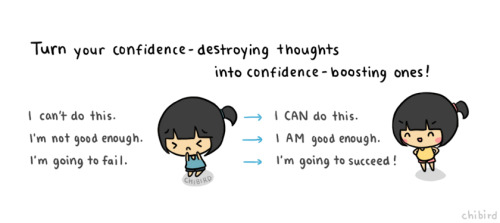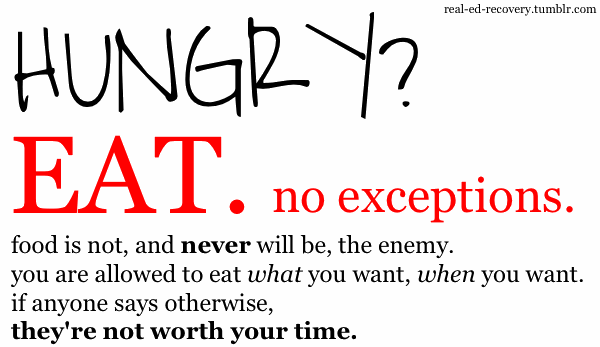 |
| Image source: chibird.tumblr.com |
- The 2500 calorie minimum applies for females 25+ years old, between 5'0" to 5'8", and experiencing starvation symptoms including but not limited to: amenorrhea, foggy-headedness, fatigue, feeling cold, hair loss, brittle nails, and dull skin.
- The 3000 calorie minimum applies for females under 25 years old and between 5'0" to 5'8" or males over 25 years old and between 5'4" and 6'0" and experiencing starvation symptoms including but not limited to: amenorrhea, foggy-headedness, fatigue, feeling cold, hair loss, brittle nails, and dull skin.
- The 3500 calorie minimum applies for males under 25 years old and between 5'4" and 6'0" or females with young children or any other unavoidable level of activity and experiencing starvation symptoms including but not limited to: amenorrhea, foggy-headedness, fatigue, feeling cold, hair loss, brittle nails, and dull skin.
Let me first hit you with the cold, hard truth. The commonly known 2000 calories a day is not what the average adult needs to maintain his/her weight and well-being; it simply just isn't enough. Furthermore, if you are recovering from an eating disorder, then that minuscule amount is woefully inadequate.
 |
| Image source: chibird.tumblr.com |
Skeptical? Here is the mathematical proof.
Let's use me as an example: I am 5'5", 19 years old, and the last time I checked (about 5 months ago), I weighed 115 pounds. Let's just say that I am 120 now. The calculations I used can be found here. First, let's calculate my BMR, the amount of calories my body needs just to stay alive.
Female BMR = 0.9 x body weight (kg) x 24 = 0.9 x 54 x 24 = 1166 calories
Okay, so if I were in a coma, then just for my body to perform the functions it needs to stay alive, I need 1166 calories. What happens when I am not in a coma?
For the sake of calculations, I am going to estimate myself as "normally lean." Let's say for this day all I did was sleep, sit around, and walk around my house to do basic functions such as using the restroom.
My hourly BMR is 48.6 calories/hour. Then supposed that I:
- Slept for 6 hours: 48.6 calories/hour x 0.22 activity factor x 6 hours = 64.15 calories used
- Sat still for 8 hours: 48.6 calories/hour x 2.00 activity factor x 8 hours = 777.6 calories used
- Ate, walked to the bathroom, and other basic activities for 4 hours: 48.6 calories x 3.00 activity factor x 4 hours = 583.2 calories used
As I have mentioned before, your body needs an energy surplus during recovery. Not only do you need to gain back critical weigh for your body to maintain itself, cushion your organs, and make hormones. When you restrict, your body is being robbed hundreds of thousands of critical calories it needs to maintain itself and therefore to recover, not only do you need to eat maintenance calories, you need to re-add the calories you restricted so that your body can have the extra energy to repair itself.
That's why recovery on simply 1200, 1500, or even 2000 calories simply isn't enough. Yes, your metabolism has slowed down. Yes, you can technically gain weight back on far too few calories, but that is only because your body will be stuck in starvation mode. Your body's primary goal is not to repair damages, but just to stay alive and therefore unless you give it a large surplus of calories, it will never allocate any energy to damage repair. The result? You will physically be "weight restored" but still stuck in starvation mode. You will be at a normal weight, but every single body function will still be damaged and impaired.
Yes, 3000 calories is scary, but it is more than necessary. I have been there. I have taken the plunge, absolutely skeptical, not knowing what to expect, and my recovery decision has surpassed my every dream.
Recovery was the most terrifying, emotional, anxiety-inducing experience I have gone through, but you know what is even more scary than 3000 calories? Being stuck battling anorexia for the rest of my life. The worst day in recovery is still far better than the best day being sick. Give recovery a try. You can always go back to restricting later
 |
| Image source: chibird.tumblr.com |
Yes, 3000 calories is scary, but it is more than necessary. I have been there. I have taken the plunge, absolutely skeptical, not knowing what to expect, and my recovery decision has surpassed my every dream.
Recovery was the most terrifying, emotional, anxiety-inducing experience I have gone through, but you know what is even more scary than 3000 calories? Being stuck battling anorexia for the rest of my life. The worst day in recovery is still far better than the best day being sick. Give recovery a try. You can always go back to restricting later


